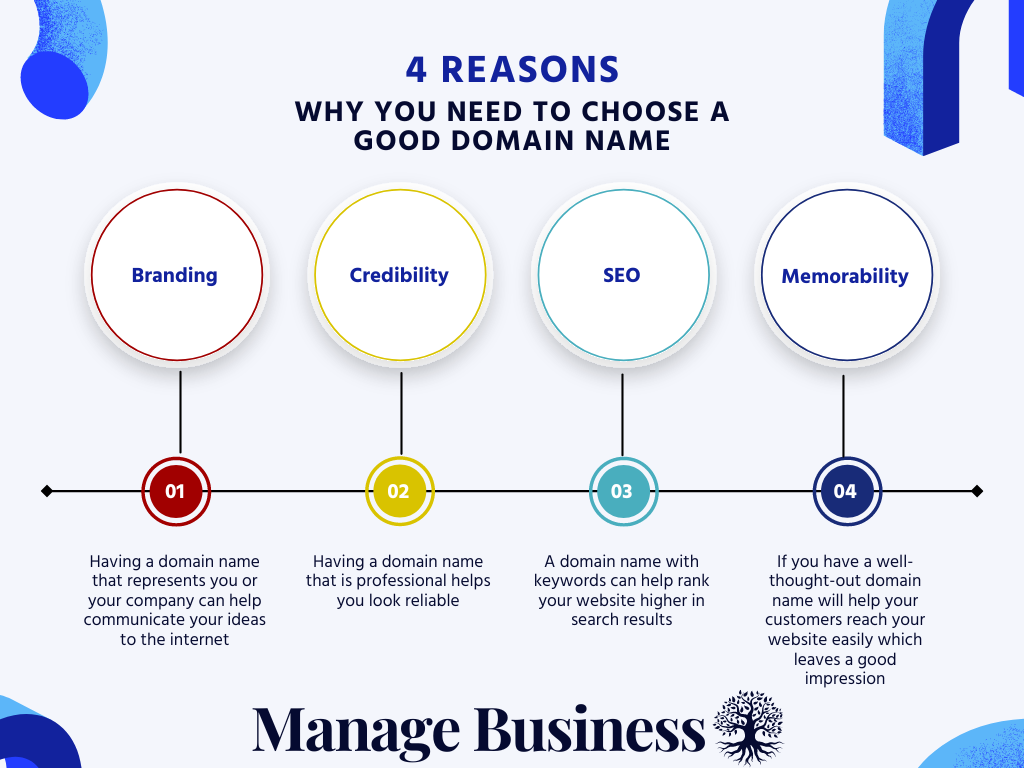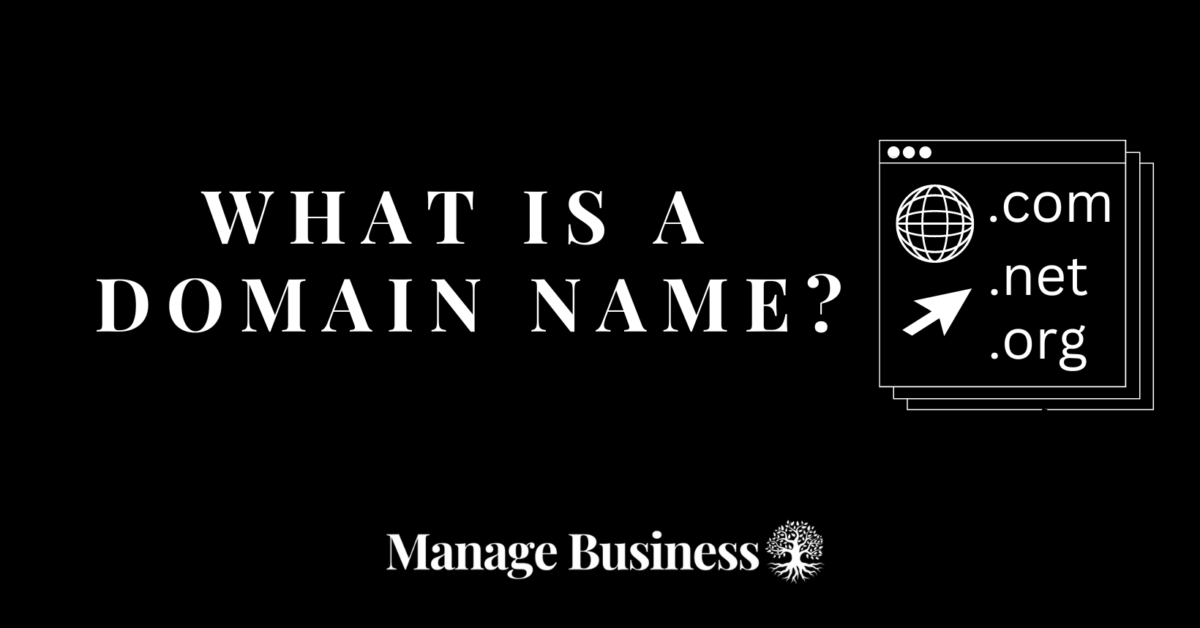Our content is reader-supported. We may earn a commission if you make a purchase through one of our links.
Last Updated on November 15, 2023 by Dr. Gabriel O’Neill, Esq.
Domain names are a big part of understanding how the internet works. You might’ve been using the internet for several years without ever actually knowing what a domain name is. Don’t worry, you’re not alone.
For starters, the domain name is a unique address for a site on the world wide web. You’re on Manage Business right now, and our domain is managebusiness.org. If you enter the exact address on your browser’s search bar, you’ll come directly to our homepage.
Intro to Domain Names
When you make an order online, the shop you’re buying from will ask you for a delivery address. This is because they need to know where to reach you with your order. This is precisely how a domain name works in the digital realm.
If you want to open a website, you type in its domain name on your search bar. You can define a domain as the address any internet user needs to access a website.
They’re also used for finding computers connected to the internet as well. In this case, domain names substitute for IP addresses which are a stream of numbers. It can be very hard to recognize or remember a bunch of numbers when it comes to remembering website addresses. We use domain names to solve this problem.
So, what’s in a domain that makes it so useful? A domain name is any combination of letters and numbers separated into 3 sections by periods. An example of this format is www.xyz.com. Make note that domain names don’t always end in ‘.com’.
Where Do Domain Names Come From?
The internet is a gigantic network of websites and devices. To reach the right website or application, you need the domain associated with it. You must have noticed that every website you use daily has a unique address. This begs the question, who manages all these domain names?
It’s the Internet Corporation for Assigned Names (ICANN).
ICANN is a non-profit organization responsible for managing domain name policies. ICANN gives permission to companies to sell and register domain names. These companies are called Domain Name Registrars.
A domain name registrar can sell, manage, transfer and renew domain names. They can also make changes to the domain name registry on your behalf. Once you own a domain name, you are responsible for telling the registrar where you want to send users looking up a particular domain name.
3 Types of Domain Names
Most domain names end in ‘.com’, but they can also end in a variety of different extensions. Some commonly used extensions that you might also be familiar with are .org, .net, .edu, and .io.
There are also more extensions that can be used but the ‘.com’ extension is the most popular one. All domain names are categorized into different types such as:
Top Level Domain (TLD)
TLDs are generic domain extensions. They’re listed at the topmost level in the domain registery system.
There’s a variety of TLDs you can choose from. The ‘.com’ extension makes up nearly 54% of all the websites on the internet. Other TLD choices include .net, .io, .info and .store, plus many more.
Although the ‘.com’ extension is popular, it could be very expensive to get. TLDs such as ‘.store’ are cheaper in comparison.
Country-Code Top Level Domain (ccTLD)
Much like the TLD, a ccTLD is a domain extension specific to a particular country. It uses two letters based on the international country codes.
To illustrate .uk represents the United Kingdom. You can check the correct country codes at countrycode.org.
ccTLDs are very useful for companies that focus on a specific country. It can also help a company diversify its content to target local audiences.
Sponsored Top Level Domain (sTLD)
sTLDs is a category of TLDs that represent a particular community. For example, educational establishments use the .edu extension and government websites use .gov.
Importance of Choosing a Good Domain Name
If you’re thinking about setting up a website, you will have to register a domain name with a registrar if you already haven’t. Here are some of the reasons why choosing a domain name wisely could help you with self-branding or with promoting your business.
- Branding: Having a domain name that represents you or your company can help communicate your ideas to the internet
- Credibility: Having a domain that is professional helps you look reliable
- SEO: A domain name with keywords can help rank your website higher in search results
- Memorability: If you have a well-thought-out domain address will help your customers reach your website easily which leaves a good impression

How to Get a Domain Name?
If you’re interested in registering a domain name and setting up a site, there are some things you need to consider:
- Availability
- Registration
- Hosting
Assuming you already have an idea of what domain name you want, you need to check if it’s available or not. You can check for availability directly by typing it into your browser. There are also tools that help you check the same thing.
You can purchase the domain from any of the available registrars. A domain can cost you on average $14.99 yearly.
After getting your name domain registered, you need to get a hosting service to get your website live. Purchasing a domain doesn’t give you hosting services automatically unless you buy it through a hosting service platform as part of a complete package.
The advantage of getting a domain through a hosting service is that you can manage and host it under the same service. When you’ve set up hosting, your website will be live and accessible on the internet.
Final Thoughts
Domain names are unique for everyone and help you navigate through the internet. If you have the domain, you have the address for the website you want to reach. If you’ve reached the end of this article, you have a sound understanding of what a domain name is and how you can get one for yourself.
About the author
Dr. Gabriel O'Neill, Esq., a distinguished legal scholar with a business law degree and a Doctor of Juridical Science, is a leading expert in business registration and diverse business departments. Renowned for his academic excellence and practical insights, Dr. O'Neill guides businesses through legal complexities, offering invaluable expertise in compliance, corporate governance, and registration processes.
As an accomplished author, his forthcoming book is anticipated to be a comprehensive guide for navigating the dynamic intersection of law and business, providing clarity and practical wisdom for entrepreneurs and legal professionals alike. With a commitment to legal excellence, Dr. Gabriel O'Neill, Esq., is a trusted authority dedicated to empowering businesses within the ever-evolving legal landscape.
